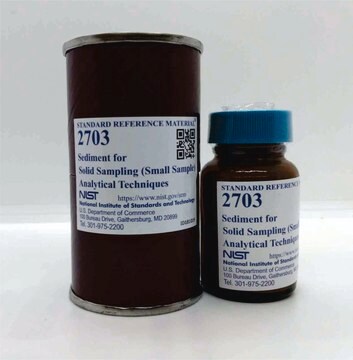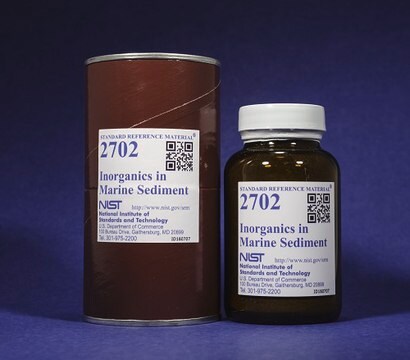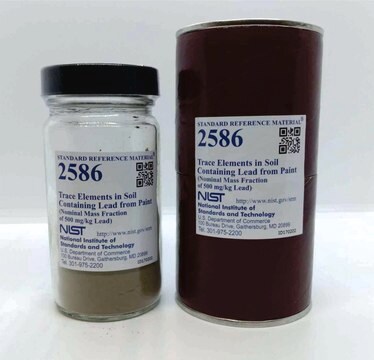BCR701
Sediment (extractable elements)
BCR®, certified reference material
Sign Into View Organizational & Contract Pricing
All Photos(1)
About This Item
UNSPSC Code:
41116107
NACRES:
NA.24
Recommended Products
grade
certified reference material
Agency
BCR®
manufacturer/tradename
JRC
application(s)
environmental
format
matrix material
storage temp.
2-8°C
Related Categories
Application
Sediment (extractable elements) has been used as a standard reference material to assess the arsenic extraction efficiency of BCR sequential and single extraction methods from water sediment samples.
Analysis Note
For more information please see:
BCR701
BCR701
Legal Information
BCR is a registered trademark of European Commission
Storage Class Code
13 - Non Combustible Solids
WGK
WGK 3
Flash Point(F)
Not applicable
Flash Point(C)
Not applicable
Certificates of Analysis (COA)
Search for Certificates of Analysis (COA) by entering the products Lot/Batch Number. Lot and Batch Numbers can be found on a product’s label following the words ‘Lot’ or ‘Batch’.
Already Own This Product?
Find documentation for the products that you have recently purchased in the Document Library.
Customers Also Viewed
Mir Md Abdus Salam et al.
International journal of phytoremediation, 21(13), 1329-1340 (2019-07-06)
In a greenhouse experiment, plant growth and copper (Cu) and zinc (Zn) uptake by four Salix cultivars grown in Cu and Zn contaminated soils collected from a mining area in Finland were tested to assess their suitability for phytoextraction. The
Arsenic fractionation in sediments of different origins using BCR sequential and single extraction methods
Baig AJ, et al.
Journal of Hazardous Materials, 167, 745-751 (2009)
Saranya Jayachandran et al.
Marine pollution bulletin, 133, 920-929 (2018-07-26)
Impact of pH variation of overlying water column on transport and transformation of Cu-sediment complexes in the bottom mangrove sediments was investigated by using different metal extraction studies. The total Cu concentration in the studied sediments varied from ~64 ± 1 to
Our team of scientists has experience in all areas of research including Life Science, Material Science, Chemical Synthesis, Chromatography, Analytical and many others.
Contact Technical Service





